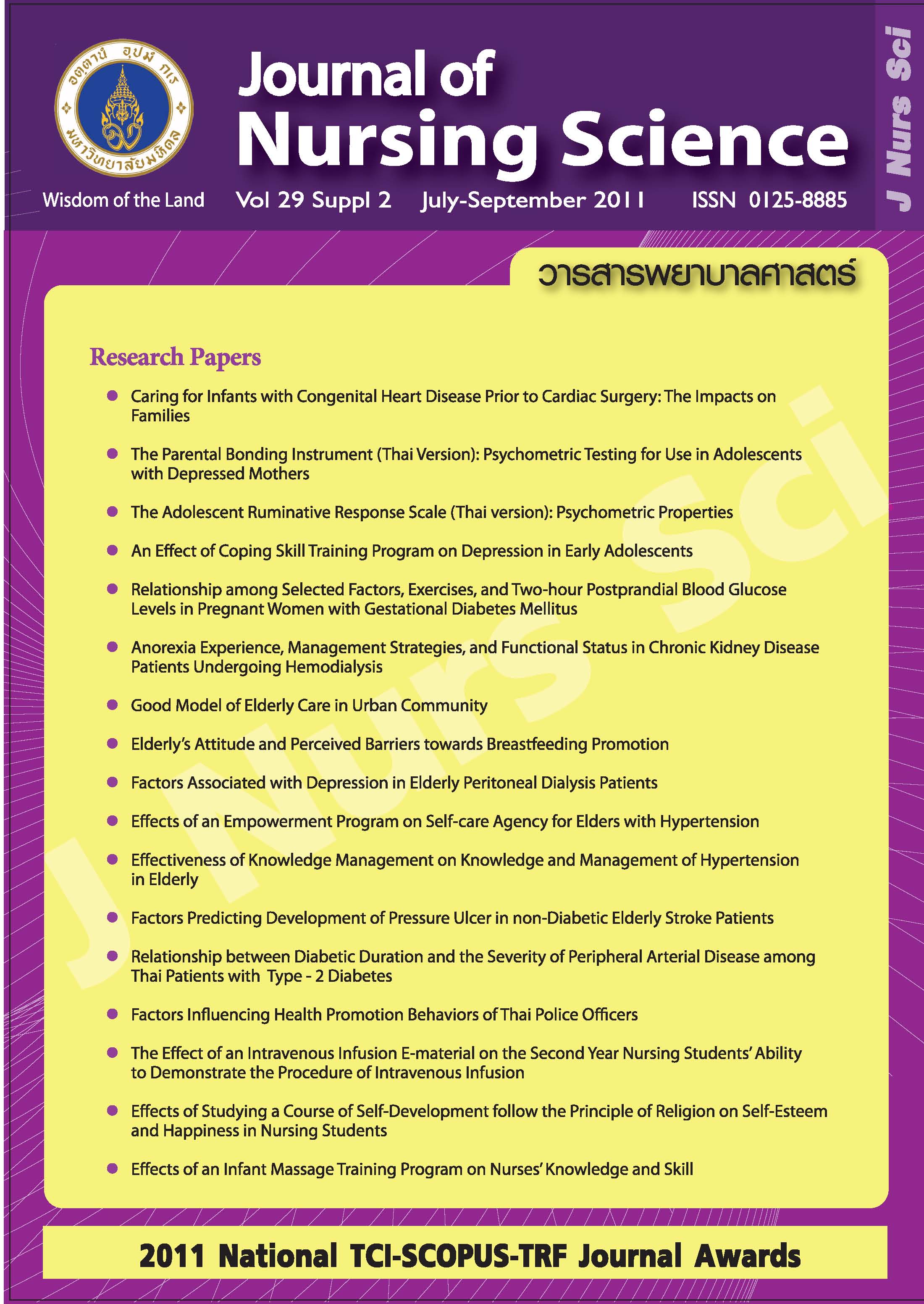Effects of an Empowerment Program on Self-care Agency for Elders with Hypertension
Main Article Content
Abstract
Purposes: The objectives of this action research study were todevelop an empowerment program to increase self-care agencyin elders with uncontrollable hypertension and to examine theeffects of the program.
Design: Action research.
Methods: A total of 78 elders with uncontrollable hypertensionwere recruited using convenience sampling. Exclusion criteriawere paralysis, critical heart disease, renal failure, and anycondition inhibiting self care. A practice guideline based onGibson’ s process of empowerment was developed for use in theprogram which consisted of self respect, problem analysis,reflection, goal setting, supportive planning, evaluation and selfcarebehavior. The subjects joined the empowerment groups 3times. Data analysis using descriptive statistics and t-test wereperformed for quantitative data, and content analysis forqualitative data.
Main findings: Elders’ self-care behaviors between pre and postprogram enrollment were significantly different (p < .05). Bloodpressure was significantly decreased after program enrollment(p < .05). Content analysis was revealed that elders were notaware of high blood pressure, lacked of knowledge, anddepended on physicians’ orders. After the program, the subjects’self-care behaviors were positively changed with, for example,increased awareness of diet control and daily exercise, increasedparticipation in elder’s group activities for reducing stress, andconsistently self-monitoring in medication use.
Conclusion and recommendations: The use of anempowerment program to develop self-care agency can increaseself care behaviors and reduce blood pressure in elders. Theprogram should be applied in primary health care settings toempower the elders for controlling their blood pressureeffectively.
Article Details
Copyright Notice: Nursing Science Journal of Thailand has exclusive rights to publish and distribute the manuscript and all contents therein. Without the journal’s permission, the dissemination of the manuscript in another journal or online, and the reproduction of the manuscript for non-educational purpose are prohibited.

Disclaimer: The opinion expressed and figures provided in this journal, NSJT, are the sole responsibility of the authors. The editorial board bears no responsibility in this regard.
References
Aekplakorn W. The report of Thailand population health examination survey IV. National Health Examination Survey Office. 2010 [cited Sep 20, 2010]; Available from:http://www.hiso.or.th/hiso/HealthReport/
report2546-2547.php?manu=4 (in Thai).
Joint National Committee on Prevention, Detection, Evaluation, and Treatment of High Blood Pressure. National High Blood Pressure Education Program. 2007 [cited Jan
, 2007]; Available from: http://www.nhlbi.nih.gov/guidelines/hypertension/jnc7full.pdf
Egan BM, Okonofua EC. The clinician’s role in improving therapeutic adherence and blood pressure in older hypertensive patients. In: Prisant M, editor. Cardiovascular Health and Vascular Diseases. New Jersy: Humana Press: 2005. P.491–517.
Lee Y. Awareness of blood pressure among older adults: a cross-sectional descriptive study. Int J Nurs Studies. 2007;44(5):796-804.
Düsing R. Overcoming barriers to effective blood pressure control in patients with hypertension. Curr Med Res Opin. 2006;22(8):1545-53.
Sritirakul S, Nuntawan C, Thrakul S, Bullangpo P, Paonibol U. Factors related to the failure of controlling hypertension. J Public Health. 1999;29(1):49-58. (in Thai).
Gibson CA. The process of empowerment in mothers of chronically ill children. J Adv Nurs. 1995;21(6):1201-10.
WHO. Self-care in the context of primary health care. Report of the Regional Consultation. Bangkok, Thailand, 7–9 January 2009; 2.
Figar S, Galarza C, Petrlik E, Hornstein L, Rodriguez LG, Waisman G, Rada M, et al. Effect of education on blood pressure control in elderly persons: A randomized controlled trial. Am J Hypertens. 2006;19(7):737-43.
Krobthong V. The effect of the empowerment process on the self-esteem development for Hypertension control (Thesis). Bangkok: Mahidol University; 2001. 294 p. (in Thai).
Husadee J. The application of the protection motivation theory with empowerment model in development preventive behavior against hypertension of the non-commissioned officer, Quartermaster Department Royal Thai Army in Nonthaburi province (Thesis). Bangkok: Mahidol University; 1998, 225 p. (in Thai).
Chaiwat S, Rojpalakorn P. Self-help group: Self care management in diabetic and hypertension. J Public Health Nurs. 2004;18(2):20-32. (in Thai).
Report of Health Care Center 29 on Statistic Information of Family Health. Bangkok Metropolitan Administration; 2008. (in Thai).
Ross S, Walker A, MacLeod MJ. Patient compliance in hypertension: role of illness perceptions and treatment beliefs. J Hum Hypertens. 2004;18(9):607-13.
Redon J, Brunner HR, Ferri C, Hilgers KF, Kolloch R, van Montfrans G. Practical solutions to the challenges of uncontrolled hypertension: A white paper. J Hypertens.
;26(Suppl 4):S1-S14.
Supranee W. Health behaviors among controlled and uncontrolled hypertensive patient at Maetang Hospital Chiangmai Provience (Thesis). Chiangmai: Chiangmai
University; 2007, 78 p. (in Thai).
Clarke A , Hanson E, Ross H. Seeing the person behind the patient: Enhancing the care of older people using a biographical approach. J Clin Nurs. 2003;12:697-706.
Wong J, Wong S. Evidence-based care for the elderly with isolated systolic hypertension. Nurs Health Sci. 2005;7(1):67-75.
Fernandez S, Scales K, Pineiro J, Schoenthaler A, Ogedegbe G. A senior center-based pilot trial of the effect of lifestyle intervention on blood pressure in
minority elderly people with hypertension. J Am Geriatr Soc. 2008;56(10):1860-6.
McManus RJ, Mant J, Roalfe A, Oakes RA, Bryan S, Pattison HM, et al. Targets and self monitoring in hypertension: Randomized controlled trial and cost effectiveness analysis. BMJ 2005;331(7515):493.
Loawsupo S. Effects of group process on self care behaviors of patients with hypertension (Thesis). Khon Kaen: Khonkaen University; 2007, 58 p. (in Thai).

